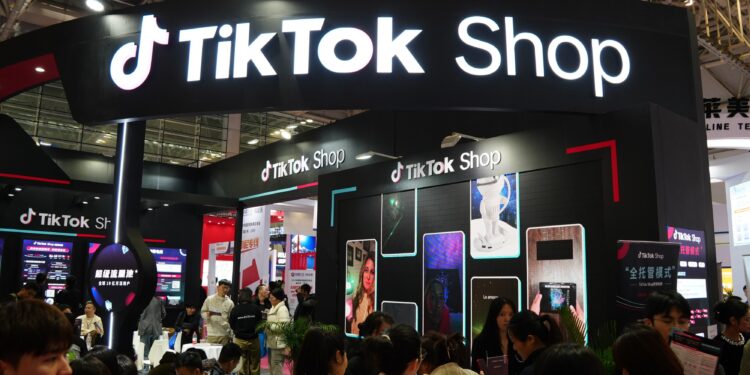TikTok is launching its e-commerce platform in Japan, expanding TikTok Shop to boost global growth and tap into the booming online market.
TikTok Shop:
TikTok Shop is an integrated e-commerce feature of the TikTok app. Through product links in videos or live streaming, users can sell goods. The offerings range from gadgets and leisure items to fashion and cosmetics. The purchasing experience is smooth and very compelling because viewers may purchase products without ever leaving the app.
TikTok Shop was just introduced in France, Germany, and Italy earlier this year, and it has already acquired popularity in nations like the UK, Indonesia, and Malaysia. TikTok is solidifying its place in the global e-commerce market with its impending launch in Japan.
Why Japan?
One of Asia’s most profitable and technologically advanced markets is Japan. Its customers are tech-savvy and used to shopping online. Japan offers TikTok the ideal potential to expand its e-commerce platform because of its large population, high smartphone penetration rate, and penchant for new trends.
Furthermore, there is a sizable community of content producers and influencers in Japan who already use TikTok on a daily basis. TikTok is putting itself in a position to dominate Japan’s cutthroat e-commerce business by fusing online purchasing with the entertainment potential of the app.
Recruiting Sellers:
TikTok is beginning to enlist local Japanese companies, influencers, and retailers to help with the launch. These sellers will be able to list their products on TikTok Shop and use live streams or videos to promote and sell them directly to customers.
Just like other markets, TikTok will likely offer discounts, commissions, and incentives to attract more sellers. This strategy has worked well in other regions, where TikTok Shop is already gaining popularity due to affordable prices and interactive selling methods.
Future of Shopping:
Live-stream shopping, also known as live commerce, is becoming a global trend. This model combines entertainment and instant buying, allowing viewers to ask questions, see product demonstrations, and make purchases in real time. TikTok is not alone in this space. Live shopping is also being investigated by companies such as YouTube, Instagram, and Amazon.
However, TikTok’s unique advantage is its short video content style, which is already engaging and fast-paced, perfect for spontaneous purchases. In markets like China, live commerce is already huge, generating billions in revenue. TikTok hopes to recreate the same success in Japan by introducing a similar approach there.
Diversifying Revenue Beyond Ads:
Until now, TikTok’s primary revenue has come from advertising. Brands pay TikTok to show their ads to millions of users. But with rising competition and regulatory issues in key markets like the United States, TikTok is diversifying its revenue sources.
The launch of TikTok Shop is a smart move. It allows the company to earn through sales commissions, affiliate marketing, and brand collaborations. This model has already shown promise in Southeast Asia and Europe, and Japan could be another major success story.
Challenges in the United States:
While TikTok is growing globally, it faces serious political and legal challenges in the US. In 2024, the US passed a law requiring TikTok’s Chinese parent company, ByteDance, to divest its US operations by January 2025.
Although former President Donald Trump extended the deadline, the pressure remains. TikTok’s expansion into markets like Japan shows that the company is focusing on alternative growth areas in case access to the American market becomes limited. This pivot toward Asia and Europe is not just about survival, it is about long-term strategic positioning.
TikTok’s Global E-Commerce:
In recent months, TikTok has made major e-commerce moves in:
- Early in 2025, France, Germany, and Italy started to expand throughout Europe.
- Indonesia, Malaysia, and the UK: Strong performance with high seller and buyer engagement.
- Japan: The next big market, targeted for launch in the coming months.
By launching in Japan, TikTok is not only gaining access to a new consumer base but also proving that its e-commerce model can work in developed economies with high expectations.
Impact on Local Businesses and Sellers:
Japanese small and medium-sized businesses stand to benefit greatly from TikTok Shop. It offers:
- New marketing opportunities
- Direct access to younger consumers
- Low-cost advertising through creators
- A platform to compete with giants like Amazon and Rakuten
For influencers and content creators, TikTok Shop creates new income streams through affiliate sales and product collaborations.
Concerns Around Data and Safety:
As TikTok continues expanding, it also faces scrutiny regarding data privacy and content regulation. Japanese authorities, like their Western counterparts, may demand more transparency about how user data is handled, especially as financial transactions become part of the platform. However, TikTok is reportedly working to build trust by partnering with local teams and complying with regional laws.
We can expect shortly:
- TikTok Shop beta testing with a restricted group of influencers and sellers
- Promotional campaigns to raise awareness about the new feature
- Live-stream events showcasing Japanese brands and products
- Local partnerships with logistics and payment providers
If the launch goes smoothly, it may consider expanding its e-commerce model to other developed Asian markets like South Korea or Singapore.
Final Thoughts:
TikTok’s upcoming launch of its e-commerce platform in Japan is a bold and strategic move. At a time when the company faces uncertainty in the US, it is smartly pivoting to Asia, where digital markets are booming and consumers are ready for innovation.
With TikTok Shop, the platform is not just a place for entertainment anymore. It is turning into a powerful marketplace where content meets commerce. If successful, this launch could redefine how people in Japan shop online and set new global standards for live commerce. As the world watches TikTok’s next steps closely, one thing is clear. The company is determined to grow, adapt, and lead in both the social media and e-commerce industries.























